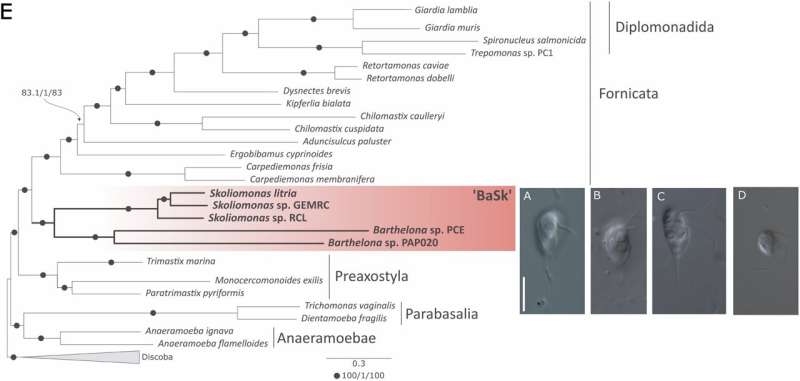August 21, 2024 report
Newly discovered, free-living eukaryote is the first known to have lost its mitochondria

An international team of geneticists and molecular biologists has discovered the first-known, free-living eukaryote to have lost its mitochondria. In their , published in Nature Communications, the group found the eukaryote while investigating the patterns and processes of genome and mitochondrion-related organelles' evolution in metamonads in water samples collected from saltwater lakes and shallow marine environments.
Mitochondria are organelles in almost every living eukaryotic cell on Earth. They are responsible for generating the energy that allows creatures to grow and to move around. Mitochondria have a double membrane and use aerobic respiration to generate adenosine triphosphate (ATP)鈥攖he fuel that provides the energy for the cell. Eukaryotes belong to one of four types: plants, animals, fungi and protists.
Prior research has shown that there are eukaryotes that have devolved mitochondria to the point that they have none鈥攇enerally because they get their energy elsewhere. Such creatures are able to gather energy by absorbing nutrients directly from another creature that does have functioning mitochondria鈥攕everal have been found in the human gut, for example.
For this new research, the team studied eukaryote evolution in metamonads, a type of microscopic eukaryote. They collected specimens from various locations and studied them in their lab. They found five that caught their eye: three found in salty soda lake sediment beds and two in shallow ocean sediments.
One stood out clearly from the other four due to its complete lack of mitochondria. They named it Skoliomonas litria and noted that it was the first-ever finding of a free-living eukaryote to have lost its mitochondria. They also note that more work is required to determine how the creature makes its ATP without using oxygen.
More information: Shelby K. Williams et al, Extreme mitochondrial reduction in a novel group of free-living metamonads, Nature Communications (2024).
Journal information: Nature Communications
漏 2024 Science X Network





















